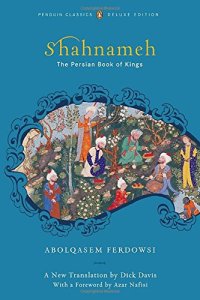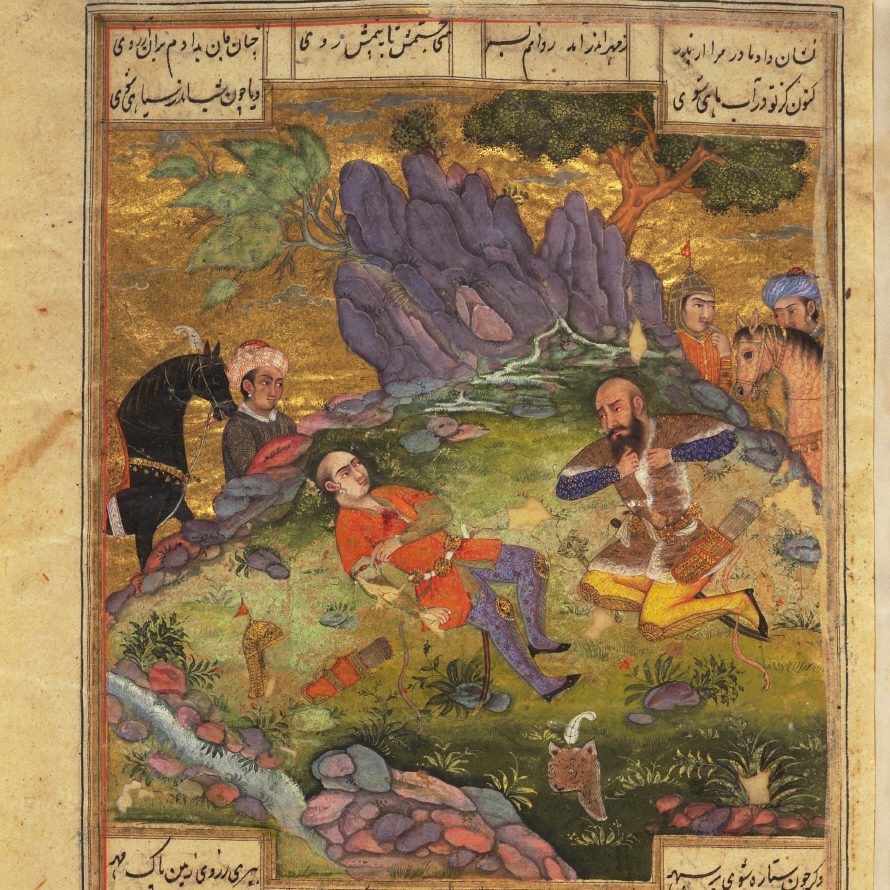Consisting of some 60,000 verses, the poem Shahnameh (also Shahnama), literally “The Book of Kings”, is the national epic of Greater Iran. Composed between 977 and 1010 by the Persian poet Ferdowsi (940-1020) under the patronage of the Samanid and Ghaznavid empires of Iran, it is relevant to both Zoroastrian and Muslim populations. Apart from modern Iran, the epic is celebrated in the cultures of Afghanistan, Tajikistan, Georgia, Armenia, Turkey and Dagestan.
The Shahnameh weaves mythical and historical information associated with fifty Persian kings and is roughly divided into three parts. The first tells of the pre-Islamic mythical creation of Persia, the second of the legendary kings and the heroes Rostam and Sohrab and the third blends fact with fiction to create semi-mythical adventures of actual kings. The narrative moves forward to the Arab invasion of the seventh century.

Rostam was unaware that he had a son, Sohrab, by Princess Tahmina. He had not seen the Princess for many years. After years without any real knowledge of one another, Rostam and Sohrab faced each other in battle, fighting on opposing sides. Rostam did not recognise his own son, although Sohrab had suspicions that Rostam may be his father.

They fought in single combat and Rostam wrestled Sohrab to the ground, stabbing him fatally. As he lay dying, Sohrab recalled how his love for his father – the mighty Rostam – had brought him there in the first place. Rostam, to his horror, realised the truth. He saw his own arm bracelet on Sohrab, which he had given to Tahmina many years before and which Tahmina had given to Sohrab before the battle, in the hope that it might protect him.
But he realised the truth too late. He had killed his own son, ‘the person who was dearer to him than all others’. This is one of the most tragic episodes of the Shahname.


The tragic tale was famously mentioned by the Afghan-American novelist Khaled Hosseini in his international bestseller The Kite Runner (2003), a major theme of which is the relationship between fathers and sons. Growing up in Kabul of 1970s, the two principal characters Amir (belonging to the upper class Pashtun tribe) and Hassan (a lower class “Hazara”; Amir’s friend and servant, and, as it is revealed later, half-brother) discuss the story quite a few times. The narrator Amir records:
Hassan’s favorite book by far was the Shahnamah, the tenth-century epic of ancient Persian heroes. He liked all of the chapters, the shahs of old, Feridoun, Zal and Rudabeh. But his favorite story, and mine, was “Rostam and Sohrab”, the tale of the great warrior Rostam and his fleet-footed horse, Rakhsh. Rostam mortally wounds his valiant nemesis, Sohrab, in battle, only to discover that Sohrab is his long-lost son. Stricken with grief, Rostam hears his son’s dying words:
If thou art indeed my father, then hast thou stained my sword in the life-blood of thy son. And thou didst it of thine obstinacy. For I sought to turn thee unto love, and I implored of thee thy name, for I thought to behold in thee the tokens recounted of my mother. But I appealed unto thy heart in vain, and now is the time gone for meeting…
“Read it again please, Amir agha,” Hassan would say. Sometimes tears pooled in Hassan’s eyes as I read him this passage, and I always wondered whom he wept for, the grief-stricken Rostam who tears his clothes and covers his head with ashes, or the dying Sohrab who only longed for his father’s love? Personally, I couldn’t see the tragedy in Rostam’s fate. After all, didn’t all fathers in their secret hearts harbor a desire to kill their sons?
Much earlier, in a 1853 collection, the British poet and cultural critic Matthew Arnold (1822-1888) adapted the story into a narrative poem consisting of 892 lines of blank verse. Here is how Arnold’s Sohrab and Rustum begins:
And the first grey of morning fill’d the east,
And the fog rose out of the Oxus stream.
But all the Tartar camp along the stream
Was hush’d, and still the men were plunged in sleep;
Sohrab alone, he slept not; all night long
He had lain wakeful, tossing on hid bed;
You can read the poem in full in a scanned version on archive.org (pages 83-122).
Also worth noting is the splendid opera Rostam and Sohrab composed by the Iranian Armenian conductor and composer Loris Tjeknavorian (born 1937) over a period of 25 years, a lot of it in Austria. Check out the first fifteen minutes (part 1 of 8) in this video from a performance in Tehran from 2000:
And finally, an informative video from the Library of Congress on the whole epic:
—-
Further Reading:
Iran in World History (2015) by Richard Foltz
—-
![]()

I first read this story years ago, in year 9 at school, when we read Sir Matthew Arnold’s version in his poem “Sohrab and Rustrum”. A powerful story.
LikeLiked by 1 person
For me it was The Kite Runner…
LikeLiked by 1 person
Sorry I don’t get this story. How could he not know he had a son, and how could a son fight him out of love?
LikeLike
Sohrab’s mother is Princess Tahmina of the kingdom of Samangan which Rostam enters while looking for his lost horse Rakhsh. Tahmina knows of his reputation and so asks for a child. He sleeps with her, gives her tokens and jewellery and stuff. When his horse is returned, he leaves. Years later Rostam and Sohrab meet as rivals on the battlefield. Rostam stabs Sohrab and then notices a necklace/bracelet he had given Tahmina. Tahmina comes to the field to save them both but it is too late.
LikeLike
Thanks. So it’s a morality fable about men deducing young women as well as all the other elements
LikeLiked by 1 person
Another brilliant piece! Heartiest congratulations. Rustam and Sohrab have been in common parlance in the Hindi belt of India from time immemorial.
Uncle Denis.
LikeLiked by 1 person
This is so interesting. If only we had had WordPress and the Internet when I was doing O levels. In 1969 my class suffered. Really suffered. We had to study the Mathew Arnold Sohrab and Rustum and to be honest I don’t think that our teacher actually understood it either. What hope was there for us! Tho the poem made an impression as I mention it in my blog under Reading list
LikeLiked by 1 person
I can imagine! I consider myself very lucky to have been born in this age.
LikeLike
Well done
This website is awesome
LikeLiked by 1 person